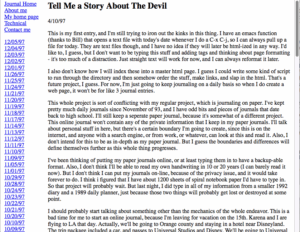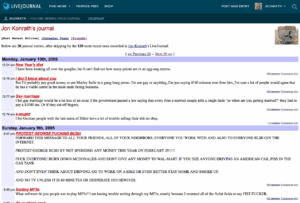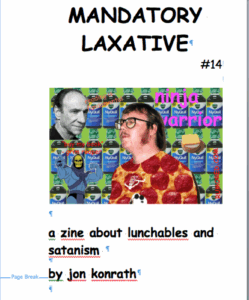 What were you doing twenty years ago?
What were you doing twenty years ago?
I was living in Seattle. Working on the west shore of Lake Union. Working on two different books, but years from finishing either. I'd done a paper zine that had petered out after a half-dozen issues, and had a personal web site I'd been running for three or four years, but it was mostly just links and had no real content.
That was one of my gripes in the early days of the web: there were very few sites with actual content. Most personal web sites were just a list of links elsewhere, and maybe a person's resume. There were a few sites focused on content, but there were no real go-to places for people generating their own content. This was obviously long before Facebook or Twitter, but it was also before Blogger or LiveJournal. It was years before the concept of blogs was even born.
In that mid/late-90s time, there were online diaries. People would hack together their own diaries online, on services like GeoCities or Angelfire, and write daily about their life. It was very much the wild west, and you had to do the heavy lifting yourself, getting an index to work, links and other things. This was before CSS was practical, before PHP was really used (PHP 2.0 wouldn't ship for another six months) and when tables and frames had just become standardized enough to use regularly across all browsers. But, some people did it. Just to give you an idea of volume: Open Pages ran a web ring for diarists, and was by far the most popular. In 1998, they had 537 members. In 1997, there were just over a million web pages on the entire web, with about 120 million users. Now, there are about 1.2 billion web pages, and 3.2 billion users. The web was a much smaller place then.
I kept a paper diary every day, and had for a few years. I didn't want to put this online, but I did want to have a place to talk about whatever. I did this a bit with my zine, but it took some work to put out each issue. I figured I could do something where I could write every day, and immediately put it live. I ate lunch in my office by myself every day, and I wanted something to do besides work on these books which would not see the light of day for years.
At the time, I had a site running from my account at the Speakeasy internet cafe, which was at speakeasy.org/~jkonrath. With the help of my friend Bill Perry, I wrote a little scrap of emacs code so I could fire up the emacs editor, hit Control-X Control-J, and be dumped into a new file with today's date plus .html as the filename. I could then write in it, save it, and it would be live on the web site. I then wrote a little C program that would crawl through the files and create an HTML index, which I put in a left-side frame. (Yes, frames. Does anyone even remember that evil shit?)
I wrote for a few years, with a few breaks here and there, and the idea was just a simple diary, of day-to-day stuff. There was no central theme, and maybe this was lack of ambition, or that I already had these books as my main project, and all I was doing was documenting my thought process. Some people started larger projects, like writing a series of essays and stories so their diary was more of a lit journal, or keeping on a theme and creating something that was more akin to a TV show or a "real" web site, like actual journalism. I didn't want to do that.
This reminded me of the zine world, and how it got huge and then fell apart in the Nineties. A lot of people made zines because it was all they could do in their pre-internet small town: go to the photocopy shop and xerox a bunch of stuff to mail to people. But some people wanted to compete with the larger publications, and tried to make their zines look more like the glossy mags. So they spent thousands of dollars on offset printing, and getting office space, and getting distribution into book stores, and it went from becoming a zine to becoming a business. It killed the spirit of DIY zines.
This is what happened when the word "blog" was invented, and some heat was applied to the market. People went from this DIY ethic to doing it for the money. Blog-to-book deals happened. People started political blogs to compete with (or be ahead of) sites like CNN. Movie rights were sold. People became celebrities. Ads were everywhere. Blogs became A Thing.
And, I kept puttering away. I moved to New York. I started publishing books. And my entries became longer and more focused, but they were still about memories and nostalgia and gripes and travel and whatever else.
LiveJournal was invented. And Blogger, and Blogspot, and WordPress, and Friendster, and MySpace, and Facebook, and Twitter. A flood of new content happened, but the bar was greatly lowered. It went from long essay writing to short update writing to very short link sharing to 140 characters to nothing but a picture or an emoji. Writing writing vanished.
I kept plugging away, although my other projects took up more and more of my time. I should look up the exact metrics – there are just over 1200 published posts now, which over 20 years, is something like once every six days. But, it's going a bit slower now – I think we're going on 100 days in 2017, and I've only got 17 entries so far. A lot of that has to do with the fact that I never know what to write here anymore. I feel like writing about the day-to-day seems dumb, and people don't want to hear about it. There's some heavy self-censorship going on there, because of the general change in what we do online, and that feeling of futility that nobody is reading this anyway. But, I've kept going.
The 34.216.9.77/ web domain started late in 1998. This was moved to Pair.com around then. I slowly made improvements to my duct tape infrastructure, but in 2009, gave up and moved everything to WordPress. Originally, the site was just called my journal, no real name. Then it got the name Tell Me a Story About the Devil. Then, around the beginning of 2011, I started calling it The Wrath of Kon. And here we are.
As I mentioned, there’s about 1200 entries, for a word count of just over a million, something like War and Peace plus Infinite Jest.
So, twenty years. There’s no reason for me to stop at this point, so let’s see what happens in the future.
BTW: if you want to read my favorite entries from over the years, go here: https://www.rumored.com/tag/favorites/

